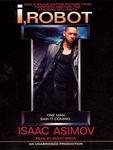
 I, Robot
I, Robot
By Isaac Asimov; Read by Scott Brick
7 CDs – Approx. 8 Hours [UNABRIDGED]
Publisher: Random House Audio
Published: 2004
ISBN: 0739312707
Themes: / Science Fiction / Robots / Mystery /
The debate rages on. Most don’t know how much the film I, Robot (to be released in July) resembles Isaac Asimov’s original work. A badge-toting Will Smith gracing the cover of this audiobook suggests that the resemblence will be tenuous at best… many say that it doesn’t matter. Whatever your opinion, the result for audiobook listeners is an excellent unabridged version of some classic SF.
I, Robot is a collection of 9 short stories, connected by an ongoing discussion between a reporter and 75 year-old Susan Calvin, robo-psychologist. She is talking to the reporter about the history of robots, or the history of U.S. Robot and Mechanical Men, Inc, the company which produces the world’s robots, and for which she works. The stories she relates to the reporter are:
“Robbie”
A small girl enjoys the family robot – a bit too much, according to her mother, who arranges its disappearance.
“Runaround”
On a manned expedition to Mercury, a robot named Speedy doesn’t return from an important mission. Unfortunately, Speedy’s mission is vital to the survival of the human crew.
“Reason”
A robot believes the unbelievable – is it possible?
“Catch That Rabbit”
A robot used for asteroid mining goes wrong, and U.S. Robots representative Gregory Powell is sent to make it right.
“Liar!”
Could be subtitled: The Mystery of the Mind-reading Robot.
“Little Lost Robot”
Susan Calvin is called in to solve a problem with a collection of robots – which one is lying and why?
“Escape!”
A supercomputer called “The Brain” is asked a question, and it answers.
“Evidence”
A prominent politician is accused of being a robot.
“The Evitable Conflict”
The Machines take an even greater role in the affairs of humanity.
The behavior of all of Asimov’s robots are governed by his famous Three Laws of Robotics (see them below), and the stories themselves are all about the effects of robots on humanity on both the personal and societal levels. These stories are excellent, intelligent, classic science fiction – some of the finest work by one of the finest science fiction writers ever – Isaac Asimov.
Scott Brick, a narrator I always look forward to hearing, performs. He is engaging throughout and reads as if he truly enjoyed doing it. He’s one of the best.
And here, as promised, are the Three Laws:
The Three Laws of Robotics
1) A robot may not injure a human being or, through inaction, allow a human being to come to harm.
2) A robot must obey orders given to it by human beings except where such orders would conflict with the First Law.
3) A robot must protect its own existence as long as such protection does not conflict with the First or Second Law.
NOTE: For more unabridged Asimov, check out Books on Tape, where Scott Brick has narrated more of his titles. Asimov’s robot novels, the first two of which are The Caves of Steel and The Naked Sun have not been produced as audiobooks, as far as I know. A glaring omission! The BBC has produced an audio drama of The Caves of Steel, however.
Posted by Scott D. Danielson

 Robert J. Sawyer dropped a few more hints about the new CBC Radio One Science Fiction anothology radio drama series Emanations:
Robert J. Sawyer dropped a few more hints about the new CBC Radio One Science Fiction anothology radio drama series Emanations:

 Hitchhiker’s Guide to the Galaxy: Live in Concert
Hitchhiker’s Guide to the Galaxy: Live in Concert

 Bernardo’s House
Bernardo’s House